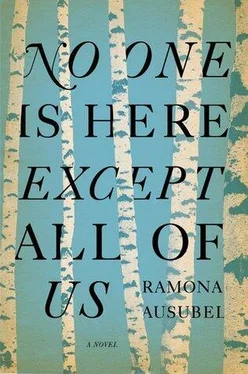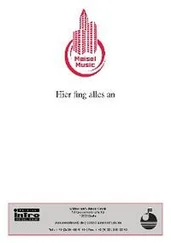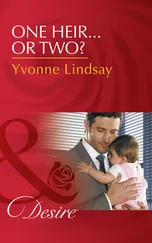Hersh poured a glass of vodka from the dusty bottle he kept hidden behind the special occasion teacups, went outside and sat down on the ground and called God’s name. Hersh said he hoped God was paying attention and not throwing curses and blessings around just to keep busy. “Look, can you just do what is right?” It was what he always asked for. Kayla, watching from the window, swore she saw God roll his eyes and take a big gulp of Hersh’s drink.
“You have to ask him for something in particular,” she said to her husband through the open pane. She had always complained that Hersh did not know how to pray right. There were plenty of worthwhile requests: to come upon a store of gold coins, a fat cow, a spring in the forest that washed the years away. Why did Hersh always have to be so abstract, so trusting?
“I want him to do what’s right,” he told her.
“You have to tell the man what you need. Don’t give him some whatever-you-think-is-best crap,” Kayla scolded. “He’s busy, he needs you to do the research for him and recommend a course of action. Tell him your daughter ought to be blessed and that even if the boy is cursed could they at least even out? And could there be many new grandbabies very quickly?”
“If he is God, he knows more than I do.”
“Apparently he makes mistakes. That innocent baby. Oops,” she said.
“I’m going to get married ?” I interrupted from the chair where I had been frozen.
“What happy news!” Kayla exclaimed.
“Now?”
“Soon.”
“How old am I?” I asked for the second time.
“You have grown a lot,” Kayla said. “You’re even older than when you asked that earlier.”
Cold air swooped inside when Hersh opened the door, and disappeared just as quickly when he closed it. He stood over me. He put his hands on my head and came in close to whisper, “Everyone knows you’ll be okay — it’s me missing you that I’m worried about.”
And for the second time in my life, I prepared to be passed on. The feeling I had was of hovering above my own life. As if I were the shed skin of an insect, and the body I used to hold had simply walked out. Even the word marriage sounded gravelly in my mouth. Mangled, half chewed. I understood nothing. But there were my hands, my fingers, and thank goodness for them, because they remembered, as always, how to do the next task. I went to my room and began to go through my things, fold and flatten, shake and stack, as if this small preparation would be enough. That was how my hands and I prayed that night. I touched everything in the room so that in the end my dirty fingerprints were on all of it. Proof that time had passed, evidence of my existence. I took out the note from my first mother to my old sister. This is how I love you , it said to her again, and again she was not there to see it. I am here, I prayed. I am real.
Igor fainted the moment he saw me enter the room. His eyes rolled back in his head and he collapsed, not onto the hard floor of his kitchen where we stood, not into the sharp corner of the table, but precisely and theatrically, into the arms of his mother. She looked at him, shock wrinkling her nose, trying to figure out how she came to be holding her grown son. He shuddered for a moment and then his eyelids opened to the world around him. Igor’s mouth widened into a gawky smile when he saw that I was still there — not dreamed but flesh — and he stood straight up, brushed his hands over his clean, pressed wool pants. To him, I looked like an exactly right young lady.
Sweat burst from the foreheads of his parents, but not from Igor’s. He weakened in all the right places, and got strong in all the right places as well. This was the story he had been told his whole life. The story of becoming a man in his own town with a nice girl. There would be little Igors soon, and the butcher would sell him nice cuts of meat, and the baker would sell him the best loaves of bread, and his wife would be capable in the kitchen (and in the bedroom, praise God who art good to me, amen). Igor was being offered a door leading out of the tragic house where no one looked him in the eye anymore. His new life appeared just like that, detailed and populated, at his feet. He had done nothing other than come downstairs in the morning wearing the clothes his father had laid out, and there it was: his future, blessed, alive and, most important, now.
The wedding was planned for a week hence, and everyone helped clean the barn for the big event. “What happens at a wedding?” the greengrocer asked while he washed windows.
“Two people turn into one,” his wife said. “Sometimes it’s a loss and sometimes it’s a gain.”
“In your case?” he asked. She shrugged and he pinched her on the back of the hand.
“A wedding can be whatever we want,” the stranger said. “Any ideas?”
“We should light candles,” the baker’s wife said.
“We should throw soft things,” two of the banker’s youngest daughters suggested. “We should dance.”
“We should break something,” Perl suggested.
“Break something?” the stranger asked.
“Yes. Because brokenness is the truth of life.” People squinted at her, drawing away. “It’s not a bad thing,” she said, defending herself. “There are more pieces to share.”
“Should we read our prayers?” the stranger wondered. Like a lullaby, this quieted us. Long before we could hear the words, we were comforted by them. The jeweler, who appeared at all times near the stranger like an attendant, a maid-in-waiting, made it official by handing her a book and pen to record the decree.
Some people brushed the sheep and some people culled dirty feathers from the hens. Some people hung garlands of flowers on rusted nails, and some took turns climbing our tallest ladder in order to clean the cobwebs and cement the tiles of our first complete constellation up on the ceiling: the Constellation of Hope, Lost and Gained, which had three stars — the star of Lena, the star of Igor and the star of the dead baby, all in a line.
The villagers put on the nicest clothes they had and men slapped their faces with alcohol and felt cleaner because of it. Everyone carried their own chairs from their own houses and set them up in rows. The barn smelled of earth and dust, of waiting. The low chatter of anticipation hovered like fog. Would today be beautiful and joyous? Would nothing disrupt the union we were trying, like magicians, to summon from thin air?
The villagers placed gifts on a table near the horses. They talked about the beauty of this, the first marriage in the new world and the joys it would bring. They talked about the first baby, which was also the first death, and decided that our stranger was right — he had not been able to live because he was conceived before the world began. What was he supposed to do? He was the last breath of the old world, and now we were truly free. The next baby would be the real first baby.
In the sunken eyes of the banker’s wife, Perl saw the bruises of loss; a mother, pecked at by a flock of justifications for her son’s death. Perl went to her, said, “It never goes away. You will always hurt.” The banker’s wife wanted to scream in the face of this woman who had come to further salt her tears. But then she looked at Perl and saw she too had a swollen heart. Waterlogged, soaked, engorged with loss and love.
“I hope Igor doesn’t ruin everything,” the banker’s wife said.
Perl had known Igor only as a kind, gentle herding dog for the flock of siblings following behind. She had a hard time imagining him ruining anything. “He’s going to be a friend to Lena. And a fine husband,” she added, though the idea still sounded like a dress-up game. The banker’s wife hid her face when tears started to pour.
Читать дальше












